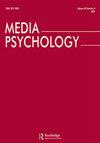社交媒体接触向上比较目标对自我评价和情绪影响的meta分析
IF 3.4
2区 心理学
Q1 COMMUNICATION
引用次数: 3
摘要
社交媒体已经成为当代文化中无处不在的一部分,是越来越多的人日常生活中必不可少的一部分。它的流行带来了无限的机会来比较自己和别人。本荟萃分析结合并总结了之前的实验研究结果,旨在得出关于社交媒体背景下向上比较目标对自我评价和情绪的影响的因果结论。我们通过系统检索确定了48篇涉及7679名参与者的文章,并将118个效应量输入到一个多层次、随机效应的meta分析中。分析显示,向上的社会比较相对于向下的比较和控制对社交媒体用户的自我评价和情绪的总体负面影响(g = - 0.24, p < .001)。具体来说,向上比较对每个结果变量都有显著的负面影响:身体形象(g = - 0.31, p < .001)、主观幸福感(g = - 0.19, p < .001)、心理健康(g = - 0.21, p < .001)和自尊(g = - 0.21, p < .001)。这一荟萃分析表明,对比是对社交媒体上向上比较的主要反应,这导致了消极的自我评价和情绪。本文章由计算机程序翻译,如有差异,请以英文原文为准。
A Meta-Analysis of the Effects of Social Media Exposure to Upward Comparison Targets on Self-Evaluations and Emotions
ABSTRACT Social media have become a pervasive part of contemporary culture and are an essential part of the daily lives of an increasing number of people. Its popularity has brought unlimited opportunities to compare oneself with other people. This meta-analysis combined and summarized the findings of previous experimental research, with the aim of generating causal conclusions regarding the effects of exposure to upward comparison targets on self-evaluations and emotions in a social media context. We identified 48 articles involving 7679 participants through a systematic search and entered 118 effect sizes into a multilevel, random-effects meta-analysis. Analyses revealed an overall negative effect of upward social comparison relative to downward comparison and controls on social media users’ self-evaluations and emotions (g = −0.24, p < .001). Specifically, there were significant negative effects of upward comparison on each outcome variable: body image (g = −0.31, p < .001), subjective well-being (g = −0.19, p < .001), mental health (g = −0.21, p < .001) and self-esteem (g = −0.21, p < .001). This meta-analysis indicates that contrast is the dominant response to upward comparison on social media, which results in negative self-evaluations and emotions.
求助全文
通过发布文献求助,成功后即可免费获取论文全文。
去求助
来源期刊

Media Psychology
Multiple-
CiteScore
8.60
自引率
7.10%
发文量
30
期刊介绍:
Media Psychology is an interdisciplinary journal devoted to publishing theoretically-oriented empirical research that is at the intersection of psychology and media communication. These topics include media uses, processes, and effects. Such research is already well represented in mainstream journals in psychology and communication, but its publication is dispersed across many sources. Therefore, scholars working on common issues and problems in various disciplines often cannot fully utilize the contributions of kindred spirits in cognate disciplines.
 求助内容:
求助内容: 应助结果提醒方式:
应助结果提醒方式:


